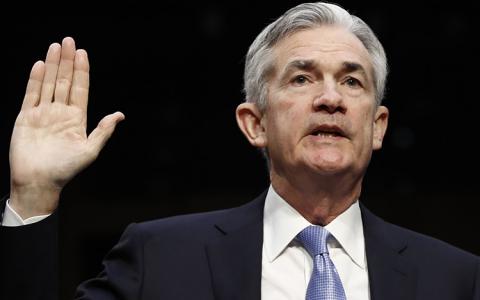
Federal Reserve Chair Jerome Powell has sketched out an altogether bumpier ride for the U.S. economy than many are predicting - one that sees business activity stop and start for months to come, until an effective treatment or vaccine for the novel coronavirus can be found.
Since the novel coronavirus outbreak in the United States, economic growth stalled almost overnight as “stay at home” orders shut down large parts of the economy. Economists and Trump administration officials have been divided about how deep and long-lasting the economic impact will be.
Some still foresee a “V shaped” recovery, in which the economy rebounds quickly from a temporary shock. Life in the United States could return to “normal” by June, White House senior adviser Jared Kushner said on Wednesday, adding that “the hope is that by July the country’s really rocking again.”
Others predict a “U shape,” where it takes longer to bounce back. The idea of a “W-shaped” recovery has also steadily gained traction as health experts increasingly warn about a resurgence in virus cases come the fall, and with it, a new downturn in economic growth.
Just under half of 45 economists responding to a Reuters poll earlier this month said the U.S. economic recovery would be “U” shaped. Ten of those polled said it would be “V” shaped, and five said it would be “W” shaped. The poll was conducted before the price of a barrel of U.S. crude oil fell below zero.
In comments on Wednesday, Powell indicated he sees even more disruption than the “W” camp. He spoke at a press conference following the U.S. central bank’s latest policy meeting, at which the Fed reiterated it will use all its tools to support the economy.
Calling all current economic forecasts “highly uncertain,” Powell mapped out why he believes the economy may go through a series of peaks and troughs for at least a year or more as the world battles to keep the virus under control.
The United States has more than 1 million confirmed cases of COVID-19, the respiratory disease caused by the virus, and more than 58,000 people have died, the highest number in the world.
(See an interactive graphic on the novel coronavirus in the U.S. here)
“We’re going to see economic data for the second quarter that’s worse than any data we’ve ever seen,” Powell said. After that, if more U.S. states begin to reopen and social distancing is gradually rolled back, the economy could begin to recover in, say, the third quarter, he said.
But that recovery could be fleeting, Powell cautioned. “This is the period as well that carries the risk of new outbreaks of the virus,” he said.
“After that period, the formal social distancing measures will be gone but you’ll still be left with probably a level of caution on the part of people who will worry and probably keep worrying for some time,” he went on, detailing why consumers, who drive two-thirds of U.S. economic growth, are unlikely to be out in force anytime soon.
“The main thing is to get into the stage where the economy is healing, where we have the disease under control, where we don’t take too much risk of second and third waves,” he said.
More than 26 million people have filed new claims for unemployment benefits since March 21, as the economy contracted at its sharpest pace since the Great Recession.
Finally, Powell noted that economic data around the world is “very, very negative and that too can weigh on U.S. performance over time.”
For all those reasons, Powell said, the central bank will do little more at this stage than wait and see what unfolds, while fully expecting that the economic impact of measures taken to contain the virus will be felt, in at least some ways, for years to come.
“This is such an extraordinary, extraordinary shock, unlike anything certainly that’s happened in my lifetime ... we’re still putting out the fire, we’re still trying to win, and I think we’ll be at that for a while,” he said.
This article originally appeared on Reuters.



